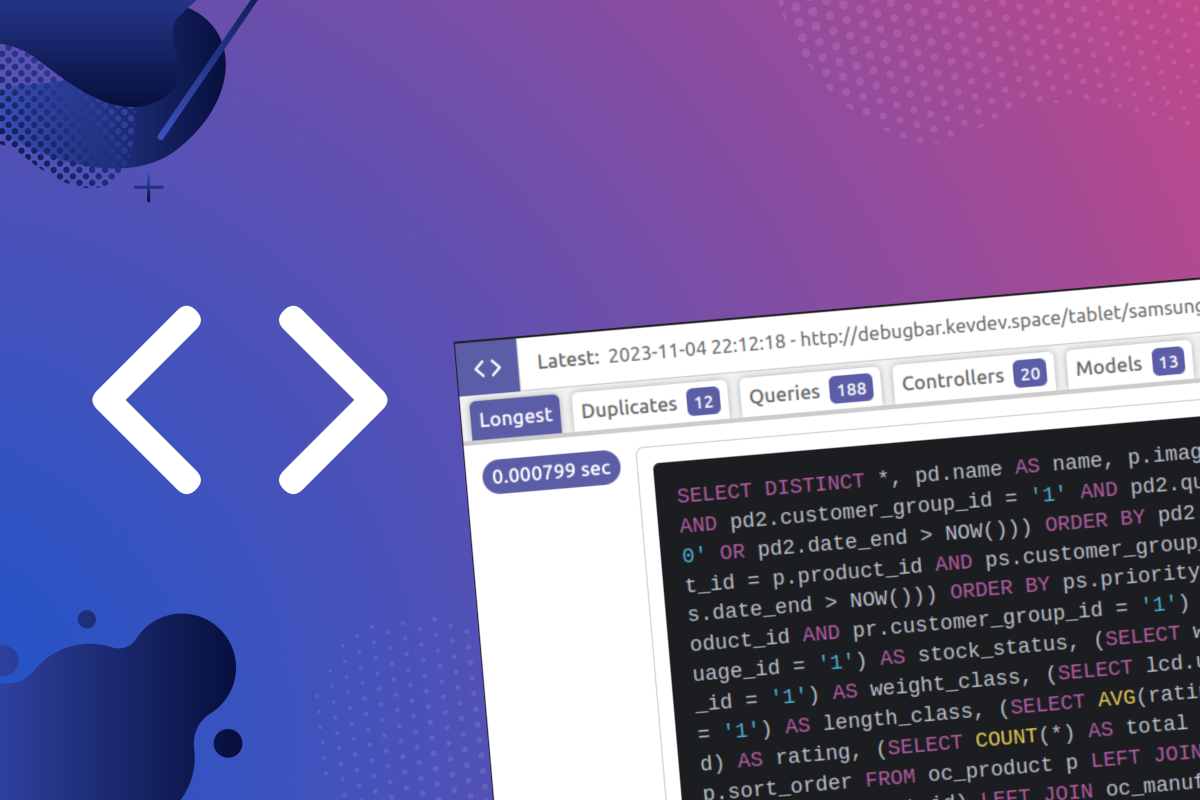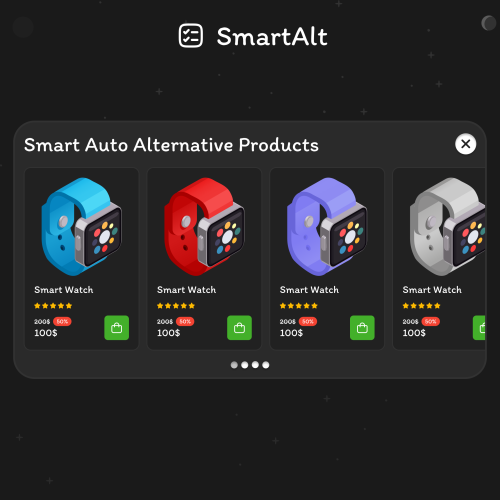-
 2
2
About This File
Невеликий інструмент який допоможе Вам дебажити ваш сайт.
Основні переваги:
- Легкий
- Відносно простий у встановленні
- Вносить зміни лише у 3 файли (header.php, loader.php, db.php)
- Дуже інформативний
- Працює лише при наявності активної сессії адміна
- Можливість переключатись між 10 останніми запитами
Недоліки:
- Модуль тестувався тільки на чистих Opencart та OcStore 3-ї версії, немає інформації щодо конфліктів з шаблонами, модулями і т.д. (але так як коду небагато то їх і не повинно бути)
- Підрахунок часу виконання запитів в бд не є реальним, підраховується різниця у часі перед початком виконання запиту та після.
Деталі:
- Longest - відображення усіх запитів в бд з сортуванням за приблизним часом виконання (наголошую що саме за приблизним часом а не точним)
- Duplicates - збирає всі задубльовані запити в бд
- Queries - відображення усіх запитів за реальним порядком виконання, та з вібораженням трейсів
- Controllers - відображення всіх контроллерів які приймали участь у відображенні сторінки
- Models - відображення всіх моделей які приймали участь у відображенні сторінки
- Views - відображення всіх темплейтів які приймали участь у відображенні сторінки
- Languages - відображення всіх файлів локалізації які приймали участь у відображенні сторінки
- Data - повний массив данних які були передані в фінальний темплейт
Встановлення:
- рекомендую почати з бекапу папки system
- встановлюємо модуль debugbar.ocmod.zip через адмін панель
- оновлюємо модифікатори
- відкриваємо файл system/framework.php та вносимо деякий код:
Спочатку шукаємо строку з кодом:
$registry->set('log', $log)
Та після неї прописуємо наступний код:
if(file_exists(DIR_SYSTEM . 'library/debugbar.php')){ require_once(DIR_SYSTEM . 'library/debugbar.php'); $debugbar = new Debugbar($config); }else{ $debugbar = null; } $registry->set('debugbar', $debugbar);
Далі шукаємо строку з кодом:
$db = new DB($config->get('db_engine'), $config->get('db_hostname'), $config->get('db_username'), $config->get('db_password'), $config->get('db_database'), $config->get('db_port'));
Та замінюємо її на:
$db = new DB($config->get('db_engine'), $config->get('db_hostname'), $config->get('db_username'), $config->get('db_password'), $config->get('db_database'), $config->get('db_port'), $debugbar);
Ну і останній крок, шукаємо строку:
$response->output();
Та перед нею прописуємо наступний код:
if(!is_null($debugbar)){ $debugbar->end($registry); }
На цьому все, та на всяк випадок прикріплю приклад повного файлу:
<?php // Registry $registry = new Registry(); // Config $config = new Config(); $config->load('default'); $config->load($application_config); $registry->set('config', $config); // Log $log = new Log($config->get('error_filename')); $registry->set('log', $log); if(file_exists(DIR_SYSTEM . 'library/debugbar.php')){ require_once(DIR_SYSTEM . 'library/debugbar.php'); $debugbar = new Debugbar($config); }else{ $debugbar = null; } $registry->set('debugbar', $debugbar); date_default_timezone_set($config->get('date_timezone')); set_error_handler(function($code, $message, $file, $line) use($log, $config) { // error suppressed with @ if (!(error_reporting() & $code)) { return false; } switch ($code) { case E_NOTICE: case E_USER_NOTICE: $error = 'Notice'; break; case E_WARNING: case E_USER_WARNING: $error = 'Warning'; break; case E_ERROR: case E_USER_ERROR: $error = 'Fatal Error'; break; default: $error = 'Unknown'; break; } if ($config->get('error_display')) { echo '<b>' . $error . '</b>: ' . $message . ' in <b>' . $file . '</b> on line <b>' . $line . '</b>'; } if ($config->get('error_log')) { $log->write('PHP ' . $error . ': ' . $message . ' in ' . $file . ' on line ' . $line); } return true; }); // Event $event = new Event($registry); $registry->set('event', $event); // Event Register if ($config->has('action_event')) { foreach ($config->get('action_event') as $key => $value) { foreach ($value as $priority => $action) { $event->register($key, new Action($action), $priority); } } } // Loader $loader = new Loader($registry); $registry->set('load', $loader); // Request $registry->set('request', new Request()); // Response $response = new Response(); $response->addHeader('Content-Type: text/html; charset=utf-8'); $response->setCompression($config->get('config_compression')); $registry->set('response', $response); // Database if ($config->get('db_autostart')) { $db = new DB($config->get('db_engine'), $config->get('db_hostname'), $config->get('db_username'), $config->get('db_password'), $config->get('db_database'), $config->get('db_port'), $debugbar); $registry->set('db', $db); // Sync PHP and DB time zones $db->query("SET time_zone = '" . $db->escape(date('P')) . "'"); } // Session $session = new Session($config->get('session_engine'), $registry); $registry->set('session', $session); if ($config->get('session_autostart')) { /* We are adding the session cookie outside of the session class as I believe PHP messed up in a big way handling sessions. Why in the hell is it so hard to have more than one concurrent session using cookies! Is it not better to have multiple cookies when accessing parts of the system that requires different cookie sessions for security reasons. Also cookies can be accessed via the URL parameters. So why force only one cookie for all sessions! */ if (isset($_COOKIE[$config->get('session_name')])) { $session_id = $_COOKIE[$config->get('session_name')]; } else { $session_id = ''; } $session->start($session_id); setcookie($config->get('session_name'), $session->getId(), ini_get('session.cookie_lifetime'), ini_get('session.cookie_path'), ini_get('session.cookie_domain')); } // Cache $registry->set('cache', new Cache($config->get('cache_engine'), $config->get('cache_expire'))); // Url if ($config->get('url_autostart')) { $registry->set('url', new Url($config->get('site_url'), $config->get('site_ssl'))); } // Language $language = new Language($config->get('language_directory')); $registry->set('language', $language); // Document $registry->set('document', new Document()); // Config Autoload if ($config->has('config_autoload')) { foreach ($config->get('config_autoload') as $value) { $loader->config($value); } } // Language Autoload if ($config->has('language_autoload')) { foreach ($config->get('language_autoload') as $value) { $loader->language($value); } } // Library Autoload if ($config->has('library_autoload')) { foreach ($config->get('library_autoload') as $value) { $loader->library($value); } } // Model Autoload if ($config->has('model_autoload')) { foreach ($config->get('model_autoload') as $value) { $loader->model($value); } } // Route $route = new Router($registry); // Pre Actions if ($config->has('action_pre_action')) { foreach ($config->get('action_pre_action') as $value) { $route->addPreAction(new Action($value)); } } // Dispatch $route->dispatch(new Action($config->get('action_router')), new Action($config->get('action_error'))); // Output if(!is_null($debugbar)){ $debugbar->end($registry); } $response->output();


















